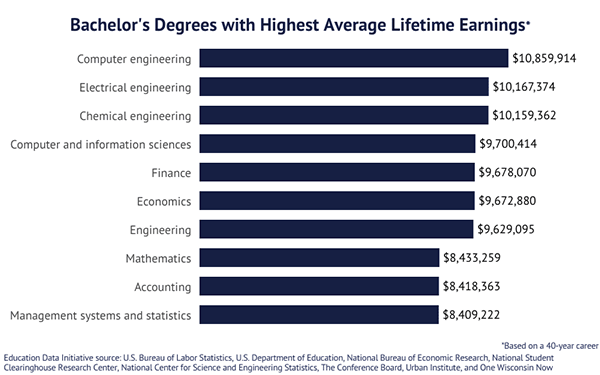
Did you know? Specialized degrees often involve internships, networking events, and other professional development opportunities. (Northeastern University)
In recent times, we are witnessing that many graduates and undergraduate students are unable to get their desired jobs.
As we all know that conventional college degrees are not the paramount that ensures job security, yet skill set is the main key to the door.
To obtain any type of advanced skill, you need to opt for specialized degree programs, and in this blog post, we are going to take a comprehensive overview of their concept.
Let’s begin!
Key Takeaways
- Understanding the core meaning of specialization
- Exploring careers that allow specializations
- Decoding possible ways to make more money through skill enhancement
- Considering the factors of autonomy and flexibility
- Discovering some unseen downsides
What Does it Mean to Specialize?
The concept of specialization will have degree candidates focus on very specific aspects of the profession that they are interested in. This can cut both ways. On one hand, this generally means focusing solely on your top interests.
On the other, it implies that you will only concentrate on what fascinates you the most. Even cake can become mundane if eaten daily, right? The degree to which boredom sets in varies by profession and individual.
For example, an emergency room nurse faces unpredictable challenges each shift, while a nurse on a neonatal floor has a clearer idea of what to expect. Specialization is most beneficial when you are certain of your passions.
For that reason, many people will wait until they have logged a few years in the field. Once they know what they like, they can find the degree or certification that will allow them to focus on it daily.
Intriguing Insights This infographic shows the bachelor’s degree with the highest average lifetime earnings.

What Careers Allow You to Specialize?
There are lots of ways to dial into a few specific skills. Lawyers, for example, have the option to pursue dozens of different practice areas. Typically, a special degree isn’t necessary to enter a new legal field. The prevalence of personal injury, divorce, and real estate lawyers arises not from specialized qualifications but from a desire to focus their expertise.
It’s more effective to excel in one legal area than to be mediocre in several. Similarly, doctors concentrate on specific medical specialties for the same reason—achieving excellence in a single field often outweighs being average across multiple ones.
The specialization process for doctors can be intricate, involving both personal interests and preliminary assessments. Additionally, many professions allow for specialization through optional graduate degrees or certifications. Nurses, for example, all start with the same undergraduate degree.
From there, they can go into Advanced Practice positions by going to graduate school. Advanced practice nursing can take several directions, but becoming a nurse practitioner is probably the most common.
Likewise, students planning to enter healthcare, research, or pharmacology often begin by mastering foundational sciences early in their education—for instance, by taking an organic chemistry online course that aligns with their career path and academic focus.
There are similar routes that professionals in social work and education can take. In these jobs, the path toward specialization is often really straightforward because there is a specific degree or certification path designed to take you where you want to go.
Do You Make More Money Through Specialization?
There is an old saying: “The riches are in the niches.” Does it seem true? Well, it depends on your specialization. You can expect to make more money than you are currently earning when you receive a graduate degree. That said, it will depend on the degree you get.
A teacher, for example, could get a master’s degree in school administration, thereby almost doubling their salary when they get a job as a principal. Or acquiring a master’s degree during their tenure will only add a few more dollars to their paychecks. Specialists in fields like cybersecurity or healthcare analytics often command salaries 40-50% higher than their generalist counterparts.
Generally speaking, making more money is a nice benefit of specialization, but not the reason people do it. Remember that most of these careers are not ones where salary alone is the primary motivation. Professionals who specialize often report higher job satisfaction and greater autonomy in their day-to-day work.
Interesting Facts
Those with graduate professional degrees, including specialized fields, may experience increased earnings and greater upward mobility.
(Source)
More Autonomy/Responsibility
Getting your master’s in education, nursing, speech-language pathology, or almost any other profession will also increase your autonomy. Again, the extent to which this is the case will depend on the situation. Generally, they craft their framework in an exemplary way to forge executive professionals who are proficient in holding teams and managing their varied operations.
With increased autonomy comes greater responsibility for outcomes. Many specialized roles involve mentoring junior colleagues and contributing to policy development within organizations.
Many specialized roles involve contributing to policy development. This combination of freedom and responsibility often leads to higher job satisfaction among professionals with specialized credentials.
Are There Downsides?
There are a couple of things you should know about specializing. The first is that, regardless of how you go about it, it probably will cost some money. Depending on your situation, who pays the bill can be different.
For example, if you are currently working as a nurse, the hospital may be willing to pay you to specialize in a new but related field. Many healthcare organizations offer tuition reimbursement programs that cover 50-100% of specialized education costs.
The other thing—there are limits to how easily you will be able to find work. For example, a school district may hire 5-10 new teachers every year. They might only need one speech pathologist or a couple of administrators.
Opportunities remain available but are now more competitive and may take time to secure. Professionals with specialized skills often gain advantages by joining pertinent associations, which offer exclusive job listings and networking opportunities.
Should this deter you from pursuing your career aspirations? Not. Just keep in mind that the journey to landing your ideal job may not be brief or straightforward. You might pivot several times before finding your groove. Be patient, and never stop looking for ways to make your work both more interesting and impactful.
Frequently Asked Questions
Ans: The toughest degrees are often considered to be in fields like Medicine, Engineering (especially specific subfields like Chemical or Aerospace), Law, and Architecture.
Ans: It’s difficult to pinpoint one single “most demanding” degree globally, as demand varies by region and field. However, some of the most sought-after and in-demand degrees worldwide include those in computer science, engineering, data science, healthcare, and business.
Ans: There isn’t a single “number one” degree globally, as popularity and perceived value vary. However, Nursing, Business Administration, and Law are consistently among the most searched and sought-after degrees worldwide.